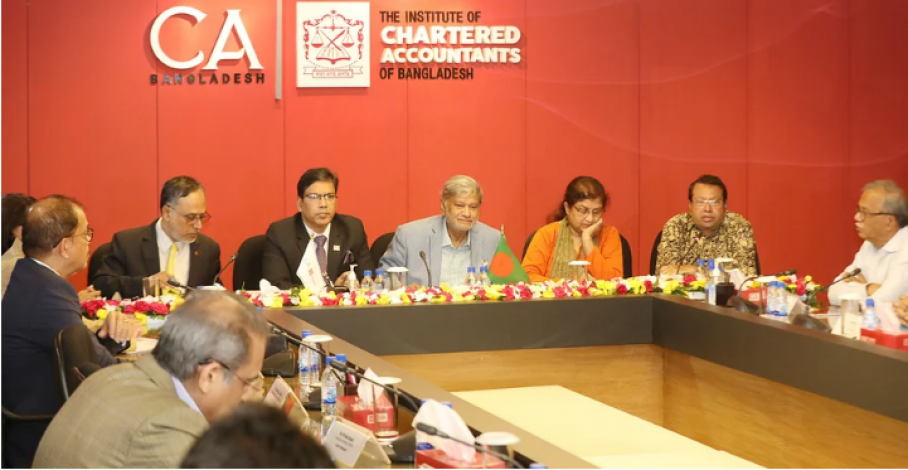
Speakers at a
roundtable discussion on the current state of the macro-economy organized by
the Institute of Chartered Accountants of Bangladesh (ICAB) and the Economic
Reporters Forum (ERF) at the CA building in Karwan Bazar, Dhaka. Photo:
Collected
Planning Minister MA Mannan has said that the government
should gradually move away from subsidizing agriculture. He said agricultural
subsidies must be continued at this time for food security; but in the long
run, the amount of subsidy must be reduced.
He was speaking at a roundtable discussion on the current
state of the macro-economy at the CA building in the capital's Karwan Bazar on
Saturday (June 4, 2022). The Roundtable was jointly organized by The Institute
of Chartered Accountants of Bangladesh (ICAB) and the Economic Reporters Forum
(ERF).
Planning Minister MA Mannan said, "I am a farmer's
child. We all have farmers among our relatives. Many changes have taken place
among those who now own agricultural land in rural area. Their homes have
changed, their eating habits have changed, their children's education has
changed. So they have enough surplus. And this surplus has been due to state
subsidies. So here it seems, one should think a little bit backwards rather
slowly. Gradually subsidies should be avoided. However, in doing so, care must
be taken not to create a situation like that in Sri Lanka. '
At the same time, the planning minister also said that steps
would be taken to reduce wastage in various projects to tackle the economic
crisis. "In recent times, we've got a new-fangled attitude," he said.
Attempts are being made to reduce that. We need to prevent waste in everything
including shopping and transportation. The Prime Minister has also given
various instructions in this regard. We are re-evaluating the priority of the
list of 1,800 projects we have. We have to decide which one is needed first and
which one is needed later. '
Ahsan H. Mansoor, executive director of the Policy Research
Institute of Bangladesh (PRIB), also spoke about reducing fertilizer subsidies.
"We have to reduce the subsidy, even if it's a little difficult," he
said.
However, Director General of the Bangladesh Institute of
Development Studies (BIDS) Binayak Sen and former Secretary of the Financial
Institutions Department Md. Yunusur Rahman have voted in favor of continuing
subsidies in agriculture. In the roundtable discussion, Binayak Sen said,
"We have to co-operate with the export and agriculture sectors in any way
we can." While other subsidies are adjusted differently, fertilizer
subsidies are not exempt. It is not a matter of any political decision;
Because, that’s our life. ’The economist also suggested rationing for garment
factory workers.
Former secretary Yunusur Rahman said, "We should not
neglect food security in any way."
Meanwhile, BIDS Director General Binayak Sen said there was no reason to worry about the current situation in the country despite the economic crisis. He said the first three of the four main indicators of the economy - agriculture, exports, manufacturing and expatriate income - are in a good position. And expatriate income will increase again in the future. Then why so much is being said about all this.
Binayak Sen also expressed anger over the information on
extreme poverty. He said that the survey data on four crore extreme poverty was
not accurate. We will have to wait for the next box income and expenditure
survey data for the actual information. But I haven't found anyone who has lost
money in the last three years. "
On the other hand, Mostafizur Rahman, a special fellow at
the Center for Policy Dialogue (CPD), blames the weakness of the institutions
behind the current economic crisis in the country. In a roundtable discussion,
he said, "The way the country's economy is going through pressure has
never been like this before. The main obstacle for us to move forward is the
institutional weakness. It must be overcome. By investing in this sector, the
institutions have to be made useful first. '
Regarding the Padma Bridge, Mostafizur Rahman said,
"The Padma Bridge is not just a transport corridor, it should be
considered as an economic corridor." There are supposed to be 17 economic
zones around the Padma Bridge. But other parallel projects are not happening
for this. You have to invest in these projects. Institutions that will work for
this, their capacity must be increased.
Abul Qasim Khan, former president of the Dhaka Chamber of
Commerce and Industry (DCCI), also spoke in favor of not raising fuel costs. He
said the country's economic base is strong, there is no debate about it; But
there is also a crisis. Fuel consumption cannot be increased in any way if the
business environment is to be maintained. We have to subsidize this sector.
Mashroor Riaz, chairman of Policy Exchange, a private
research institute, has suggested increasing the supply of dollars by reducing
government spending as a short-term initiative to tackle the economic crisis.
He said the Corona epidemic and the current Ukraine-Russia war have led to
inflation, food crises and instability around the world. The budget needs to be
planned keeping this situation in mind. ”He also suggested diversification of
exports, free trade agreement and reform of economic policy of the government
as a long-term initiative.
ICAB President Md. Shahadat Hossain and ERF President
Sharmin Rinvi gave welcome speeches at the beginning of the round table
discussion. Former President of ICAB Md. Humayun Kabir conducted the program.
|Source: Online/SZK
Comment Now